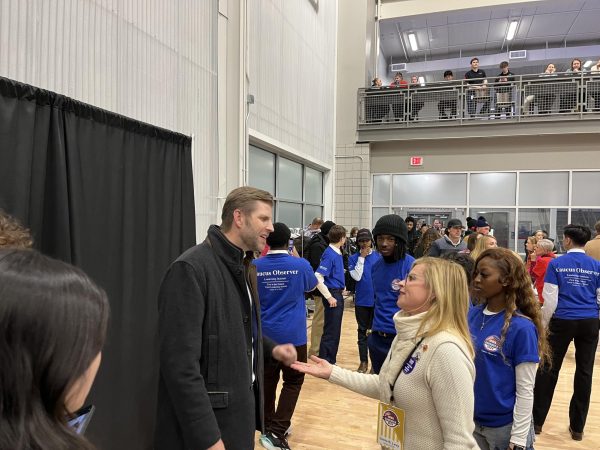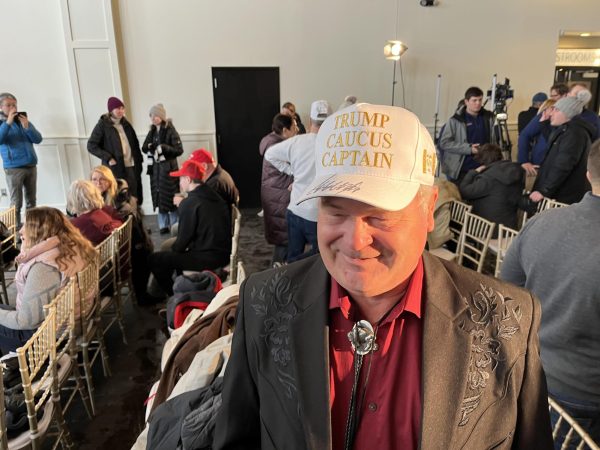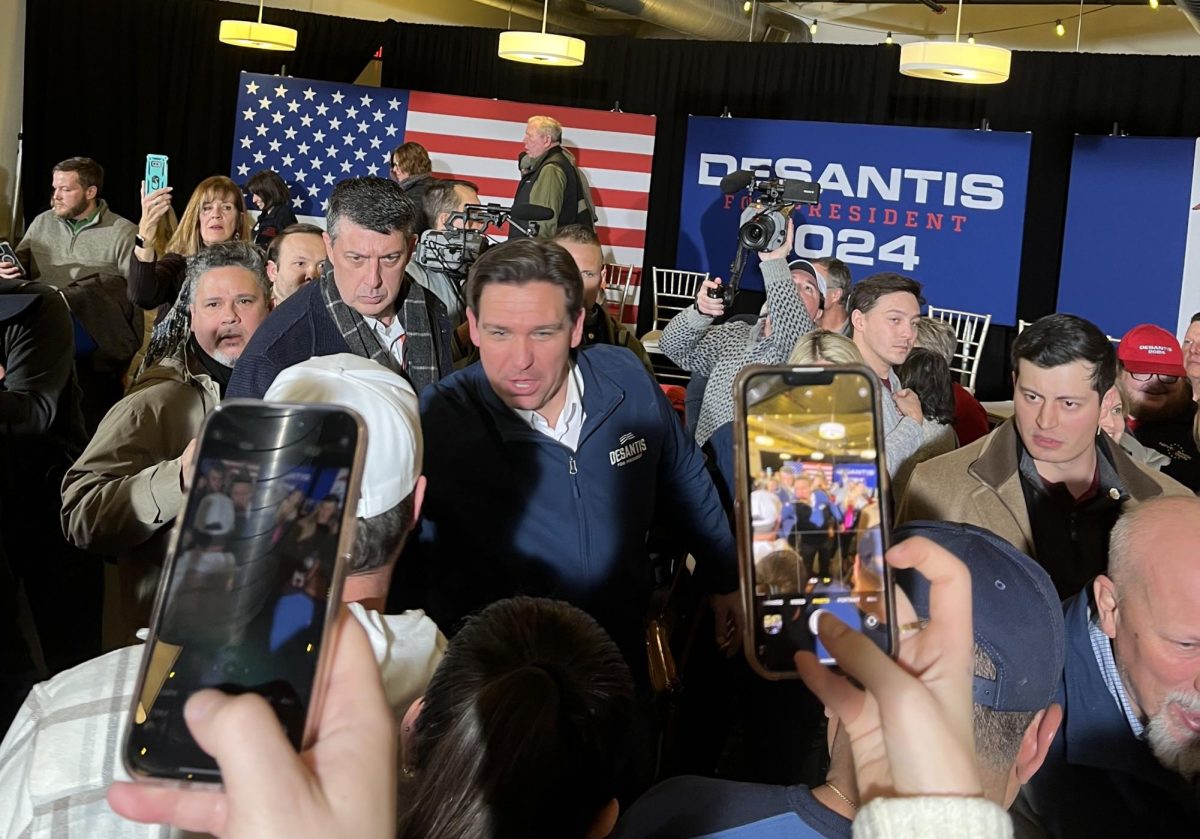Gov. Ron DeSantis likes to make an appearance, but he doesn’t like to do it alone. This became clear to me the day before the Iowa caucus Jan. 15 when Republicans voted in the nation’s first nomination contest, and DeSantis held a rally at District Venue restaurant in Ankeny, Iowa.
“We just want to dance here, someone stole the stage….” Starship’s 1985 American hit “We Built This City” blared from speakers affixed to the walls. An open bar was dishing out drinks by the pint. An intoxicated elderly lady was jumping on beat to the chorus, eliciting cheers from the audience of predominantly older couples and men donning baseball caps printed with “DeSantis 2024.”
The stage cycled through seven introductory speakers: Joni Ernst to the Lieutenant Governor to the pastor’s invocation to a radio presenter named Steven Dace to a Kentucky Congressman to a Texas Congressman to Iowa Governor Kim Reynolds. Each speaker received about 10 seconds of rock music as an introduction.
Like a five-act Shakespearean dramedy, the event’s main act did not appear until the audience almost doubted whether he would even show up. I traveled to the caucus with a group of other high school journalists or kids who excelled in their AP history classes. All of us, including myself, were close to erasing the event from our reporter’s notebooks, just as we had done the whole weekend every time we showed up at a Trump rally that was delayed and then canceled.
Nearly an hour after the event’s start time, DeSantis appeared onstage with his family. It came as a shock when DeSantis finally appeared in the flesh rather than embedded within proclamations of praise from his series of introducers. Equally as shocking was DeSantis’ decision to drop out of the presidential race Jan. 21 and endorse Trump mere hours after posting to social media to reaffirm his stance on cutting funding to the United Nations.
According to the New York Times, DeSantis began scheduling his quiet exit in the wake of his extreme loss to Trump at the Iowa caucus, cemented by his flagging popularity in New Hampshire and South Carolina where former governor Nikki Haley was likely to pull ahead in the primaries.
Now, Haley is the last contender standing to challenge Trump as the Republican candidate to face-off against President Joe Biden. But, with both DeSantis’ and former candidate Vivek Ramaswamy’s endorsement of Trump, the odds were stacked against Haley as DeSantis supporters are likely to flock behind the candidate most aligned with their more stringent conservative views. A surprise sweep by Trump in the New Hampshire primary Jan. 23 had already foreshadowed that the two-horse race for the Republican nominee may not be quite neck-and-neck, as he maintains a bigger presence from a courtroom in New York City than any of his competitors carting along the campaign trail.
When I returned from the caucus, emerging from the record-breaking arctic blast that smothered the weekend of rallies and voting, I was constantly asked what it was like to meet Trump. I had no good answer because, despite many efforts to attend one of his events, nearly all of them fell through. The mythology that surrounded him and his unwavering fan base remained intact.
I spoke with a temporary Precinct Chair named Dylan Keller while voting was taking place on caucus night to try and get an understanding of what swayed voters one way or another.
From the way he began talking about the ethos of the Republican party, it seemed as if we were talking about potential actors on the list of Oscar nominations.
“The biggest thing a candidate can have is name recognition,” he told me.
And, there’s the impact of a fanbase that relies less on policy ideologies and is rather contingent on the welcoming rah-rah of the former President’s groupies.
“Your comfort level is instantaneous when you talk to someone about Trump,” Keller said. “Groundsmen support just doesn’t go away.”
In a similar vein, a local journalist from Iowa Starting Line Ty Rushing described Trump as “a celebrity who became President.”
The closest I got to meeting Trump was shaking hands with his son, Eric Trump, who was helping him along the campaign trail, and who had delivered a speech at the emptied-out rally earlier in the day.
Eric Trump showed up at the RecPlex West megasite where three precincts were tossing in their ballots. There was no way he could have foreseen that Dallas County would be the only county in the entire state where Haley came out on top. She won all three precincts, but by the time the ballots were tallied, Eric Trump was long gone.

A representative for each candidate had three minutes to speak. Eric Trump kicked off the speeches, focusing mainly on conveying a paternal image of his father to his audience of Iowa Republicans.
“He’s been the greatest father in the world,” Trump said. “When I was four years old, five years old, he would give me a little kiss. ‘Eric, no drinking, no drugs, no smoking.’ It’s very different from our counterparts in Washington, D.C. right now.”
He did not discuss the most hotly debated topics of the primaries thus far, like border security, antisemitism on college campuses, or turbulent foreign policy. It seemed like I knew Trump in every way but as a presidential candidate.
Such was also the case for Dave Lage, a die-hard supporter. He was one of few in the dying crowd that waited for Trump to make an appearance after the Jan. 15 rally was delayed by two hours. Lage had been elected as a Precinct Captain for Trump, meaning he would be encouraging and facilitating voting on caucus night.

As a day job, he works with his wife Patty Lage as co-founder of Holy Spirit Led Ministries where they perform healing services and lead disciple groups in Spring Hill, Iowa. He said he was inspired to offer these services after multiple near-death encounters throughout his life, such as being struck by lightning four times. Two of the four happened in a single month.
“After you get hit with lightning and go to heaven, it changes you,” Lage said. “I didn’t get hurt, but I was taken out of my body.”
As a result, Lage said he believes God picked Trump to lead the Republican party.
“I’ve actually been dead, been to heaven, walked with Jesus,” Lage said. “Jesus chose Trump. I’d be a fool to try and help somebody else come against Donald.”
On the flip side, Lage said he likes Trump because the former President is just like everyone else.
“He’s just common folk,” Lage said.
When it comes to the 91 counts of felony stacked against the leading candidate, Lage said it seemed inevitable that a larger force would try and take him down.
“When you’re getting attacked, you can’t do anything right, no matter how much right you do,” Lage said.
Registered Republican Brad Davis also voted for Trump on caucus night, citing a similar defense that the more charges mount over Trump, the more it demonstrates that greater powers are determined to take him down.
“He was falsely charged on so many things,” Davis said. “These accusations never stop, and they don’t prove anything.”
Lage also went on to talk about Trump’s push to “have a free country, by the people and for the people,” encapsulating the coexistence of Trump’s relatability to defend Americans from a corrupt central government, while also maintaining a divine power that exceeds us all.
When Eric Trump did discuss his father’s politics, he described Trump as a savior of the American ethos, both in his tenure as President and in his aspirational goals.
“He did all those things, he doesn’t need to be doing it,” he said. “He can live a much nicer life, not politics. But he loves his country. We love the Constitution. We love the First Amendment. We love the Second Amendment. We believe in religious liberty, we believe in the ethos of the United States of America that’s being ripped away from all of us.”
DeSantis, on the other hand, focused his rallies on affirming his strict conservative stance on issues like educational autonomy and border control.
When DeSantis took the stage for what turned out to be one of his final organized rallies of the 2024 race, he took a few minutes to wait for his supporters’ chanting to die down, gently coaxing the audience into silence.
“We could do a sitcom on this,” he said, gesturing to his three wide-eyed children and smiling wife. “This is taking a Florida family and dumping them in the middle of a blizzard in January.”
DeSantis visited all 99 counties in Iowa ahead of the caucus, scraping past Haley to be Trump’s runner-up, although 30 percentage points lie between them. While former President Donald Trump ducked out of Iowa on his victory night to catch a plane to his court hearing in New York, Ron DeSantis and Nikki Haley diverged to gain footing in New Hampshire and North Carolina ahead of the primaries.
Music choice has proven to be a vital selling point in setting the tone for a rally. At one of Haley’s rallies on Jan. 14, she brought over a dozen women in pink boas and cowboy hats to their feet with “The Power of Love” by Celine Dion and “American Girl” by Tom Petty.
DeSantis chose Bruce Springsteen’s “Born in the USA.” Whether it appeared on the playlist because of its family barbecue sense of promise, or as a precursor to his stance on border security, it is hard to say.
One of his final remarks came from Ronald Reagan. “Freedom is one generation away from extinction,” he said, nodding and looking directly into the flanks of cameras elevated on the press platform.
After less than 15 minutes, DeSantis brought his speech to a close.
“Thank you, thank you,” he said. “Alrighty. Thank you. Wonderful. Does anyone have a question?”
For the question period, Congressman Thomas Massie and Representative Chip Roy returned to the stage, flanking DeSantis in a choreographed tableau.
He responded to people with affirmations related to border security, the Israel conflict, and how above all, he is committed to following through on his promises.
He called on a teenage girl. The red and blue baseball caps swung to face the back, where the girl was standing behind the seated rows.
She opened with the words “Perry High School” and “gun laws,” and DeSantis’ smile slumped into a line. His eyes narrowed and he swung the microphone cable back and forth, waiting for the right moment to cut in.
“You’re learning to spew propaganda,” he said. “You should stop that. Do we have any Iowans who have a question?”
It was a show-stealing moment. For a few seconds, it was quiet: DeSantis’ performance became more silent than Trump’s empty stage.
The crowd began rustling their blue and red signs and then picked up a chant to boo the girl out of the room.
It was hard for me to look at him after that. Regardless of DeSantis’ stance on gun laws or any other political ideology that misaligned with my own, he failed to give his audience the respect of providing a response, and for that, I knew there was no way his popularity would grow much further outside the safety of a planned rally. No amount of booze or Springsteen could mask his crumbling facade.
He continued answering questions with some interjections from the team around him. It wasn’t much longer before the whole crew exited the stage, including the two dozen or so family members and campaign staff that had been seated behind him on risers – the kind that school choirs perform on – for the entirety of the evening.
However, the most theatrical play of all seemed to take place at Trump’s final rally Jan. 14. The quiet hours of anticipation were broken up by hushed whispers between news anchors and their producers echoing across the emptying hall.
“He’s not coming,” a reporter said to their camera operator.
It wasn’t long before the announcement was made after a two hour delay that the event was canceled. Supporters began to leave, a stream of MAGA hats silently filing out the door.
On his way out, a reporter stopped Lage. He had become a popular interviewee as the crowd dwindled out and his sparkly gold “Trump Caucus Captain” baseball cap shone from across the room.
“What would it take for you to not vote for Trump?” the reporter asked.
He paused. He really thought about it.
“Another lightning bolt.”
And then he was gone.






